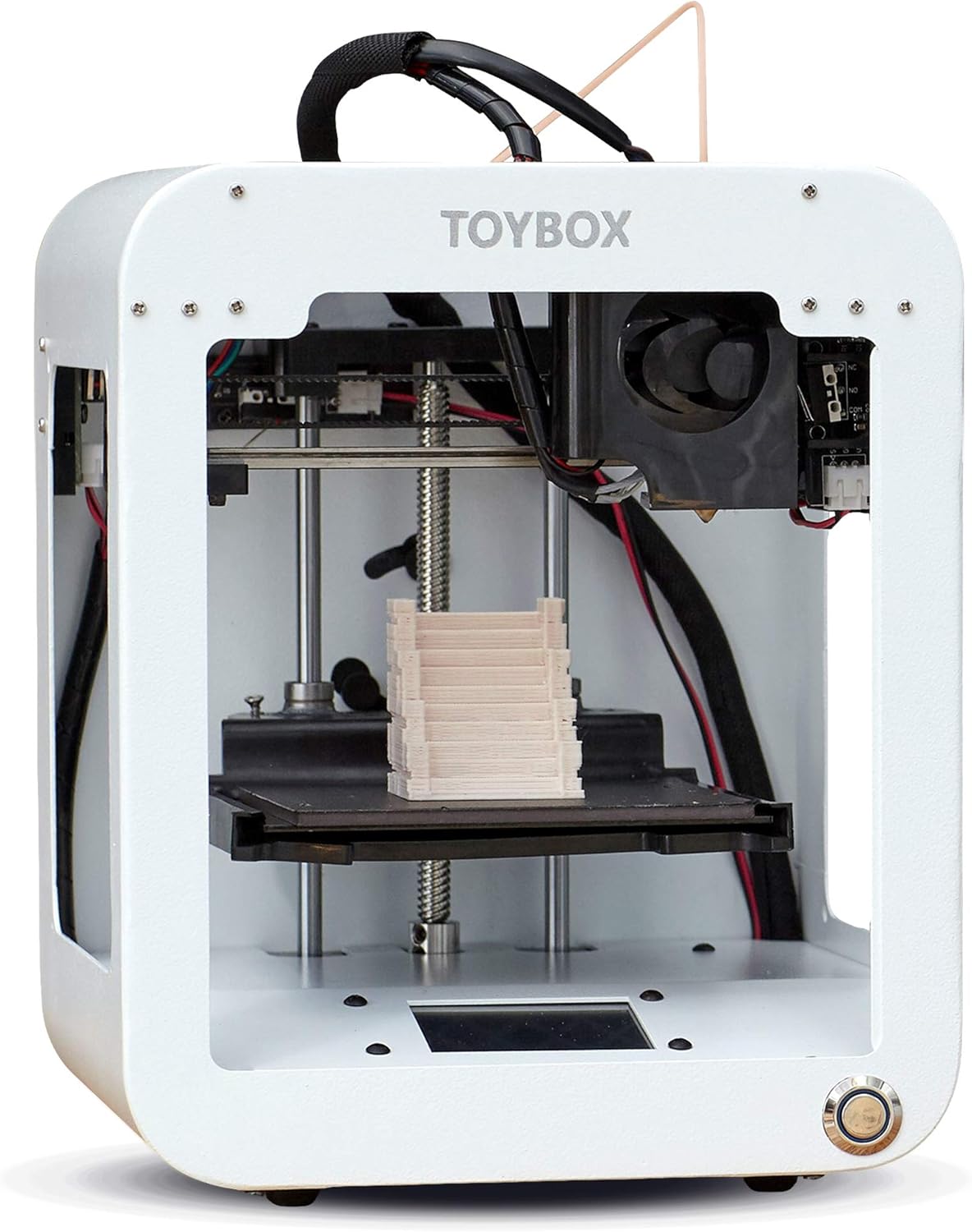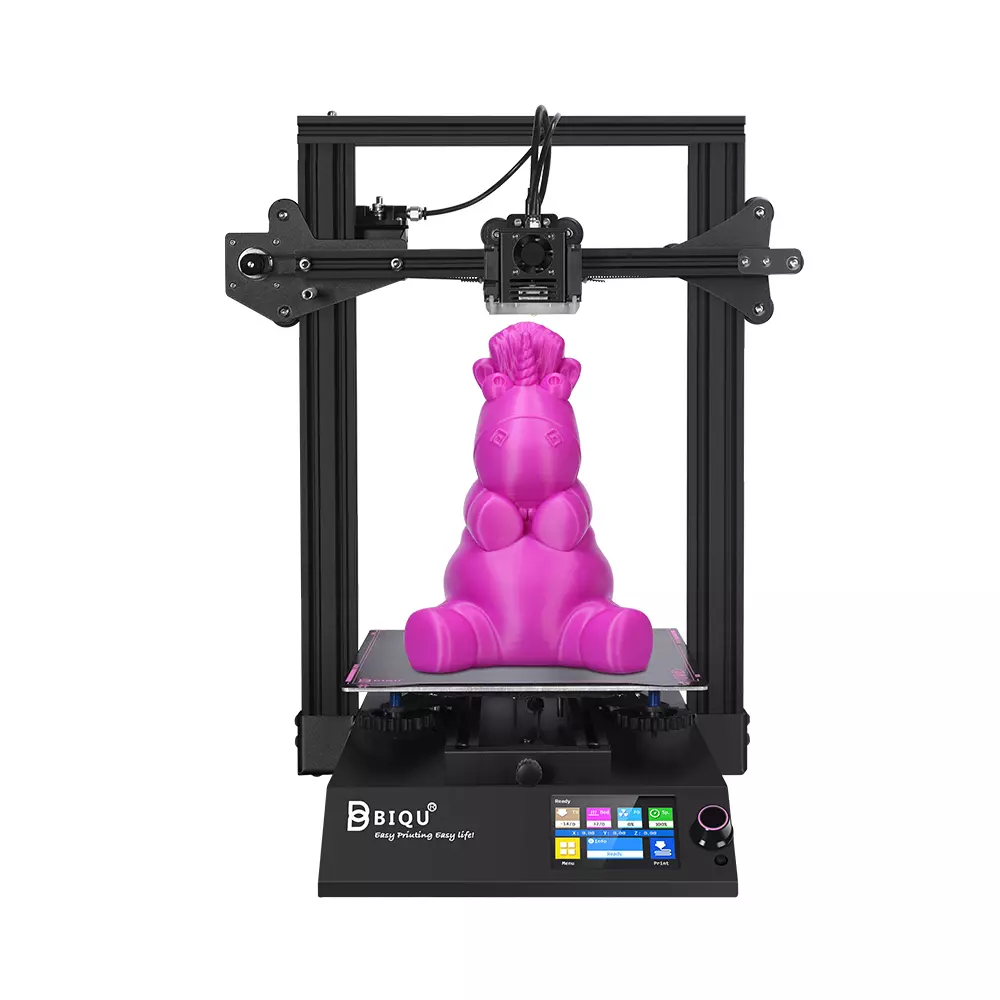Compare Toybox vs BIQU B1
Comparison between the best 3D printers
Choose the best 3D printer at the best price. The cheapest 3D printers are here.
Buy a 3D printer here with 3D Fila.
 |
 |
|
| Model | Toybox[BUY Toybox] |
BIQU B1 |
| Printing Material | Filament | Filament |
| Buy Filament for Toybox Toybox | Buy Filament forBigTreeTech BIQU B1 | |
| Estimated price | $299,00 | $269,00 |
| Manufacturer | Toybox | BigTreeTech |
| Release Year | 2024 | 2020 |
| Print Volume [mm] | 70x80x90 | 235x235x270 |
| Printer Size [mm] | 190x190x230 | 412x402x492 |
| Weight [kg] | 3 | 8,00 |
| Power Loss Recovery | NO | YES |
| Enclosed printer | NO | NO |
| Bed Leveling | Manual | Manual |
| Filament End Sensor | NO | YES |
| Bed type | Heated | |
| Power supply system | Direct Drive | Bowden |
| Standard nozzle | 0,5 | 0,4 |
| Maximum Nozzle Temperature [°C] | 210 | 250 |
| Maximum Bed Temperature [°C] | 100 | |
| Maximum printing speed [mm/s] | 60 | 100 |
| Filament holder | YES | YES |
| Camera for supervision | NO | NO |
| Recommended filaments | PLA | PLA, TPU, ABS, PETG |
| Recommended slicers | Toybox | Cura, Simplify, Slic3r |
| Maximum Resolution [mm] | 0,2 | 0,1 |
| Processor | 32 Bits BTT SKR V 1.4 | |
| Display | Touchscreen 2,4'' | Touchscreen TFT 3,5'' |
| Power Supply | 24V / 360W | |
| Connectivity | Wi-fi | SD / USB |
| Operating systems | iOS, Android | Windows, Mac, Linux |
| Date of registration in the system | 2024-08-06 | 2021-04-14 |
| Release date | 2024 | 2020 |
| Extra features | The Toybox 3D printer is an excellent option for children and beginners. Easy to use, with intuitive setup and simplified operation via an app. The Toybox allows you to print thousands of toys and projects through a user-friendly interface. It has a removable magnetic table that makes it easy to remove printed objects. The filament is PLA, safe for children, and the printing is reliable and error-free. It also offers custom design options, allowing you to create and print drawings and photos. | The BIQU B1 is an advanced 3D printer with a silent 32-bit BTT SKR V1.4 motherboard and ARM Cortex-M3 CPU, offering DIY interfaces (I2C, SPI, WiFi) and dual Z-axis. Its dual BTT B1 TFT35 V3.0 operating system allows real-time monitoring and multiple printing modes, including G-code visualization effects. It stands out for its BIQU SSS (Super Spring Steel), ensuring easy model adhesion and simplified removal, with the possibility of using it on both sides. It includes a filament sensor, automatically pausing printing in case of filament breakage. The multicolored RGB lights integrated into the hotend allow you to view the printing status even at night. Additional notes include the need for a BIQU-specific Type-C cable and extra interfaces for smart filament sensor and BL Touch. |
| Support for multiple colors and materials (AMS and CFS) | NO | NO |
Notes * |
||
| Cost-benefit | 6 / 10 | 7 / 10 |
| Hardware | 0.8 / 10 | 2 / 10 |
| Tela | . | . |
| Print volume | 3 / 10 | 3 / 10 |
| Performance | 0 / 10 | 1 / 10 |
| [BUY Toybox] |
Conclusion |
| In conclusion, when comparing the Toybox and BIQU B1 3D printers, both models offer unique advantages tailored to different types of users. The Toybox, released in 2024, is designed for beginners and children, featuring an intuitive app interface that simplifies the printing process. It focuses primarily on toy printing with good reliability, although its smaller print volume and limited material compatibility may restrict more advanced users. On the other hand, the BIQU B1, which debuted in 2020, caters to a more experienced audience. It boasts a larger print volume, compatibility with various filament types (including ABS and PETG), and advanced features like power loss recovery and a filament sensor. Its performance metrics and customization options appeal to hobbyists or professionals looking for a versatile machine, despite the steeper learning curve. In terms of cost-effectiveness, the BIQU B1 edges out with better hardware features, making it a more practical choice for users who require enhanced capabilities, while the Toybox remains a solid option for its ease of use and accessibility. Ultimately, the choice between these two printers hinges on the specific needs and skill levels of the user, with the Toybox prioritizing simplicity and the BIQU B1 offering flexibility and performance. |

